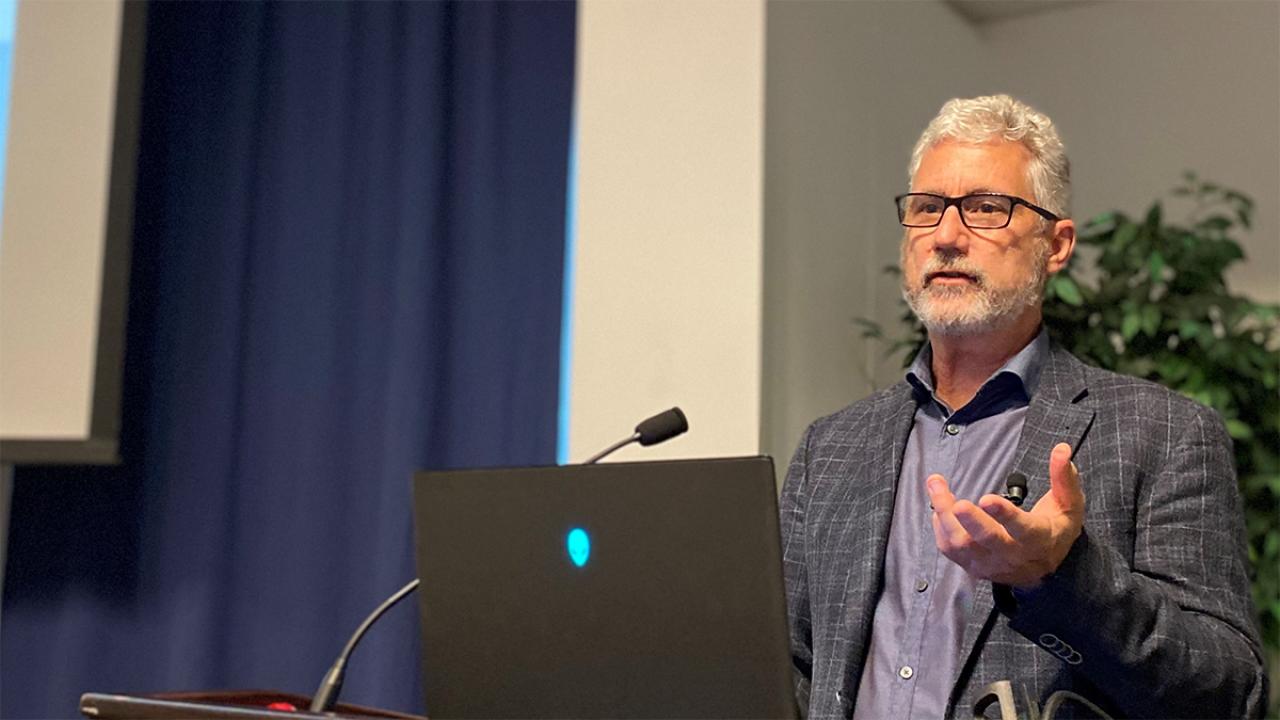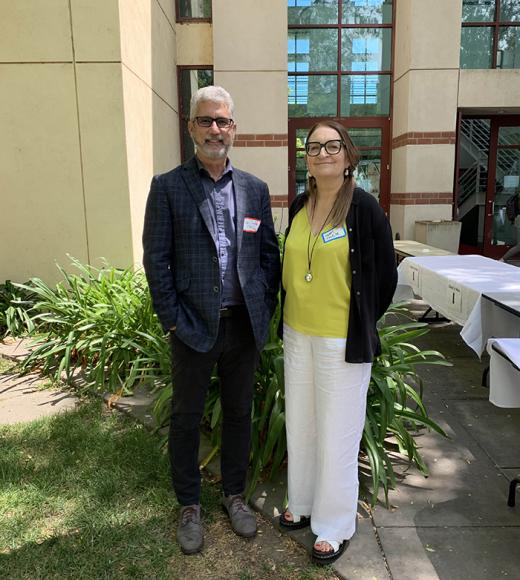
Jet fuel from poplar trees is on the horizon, thanks to collaborative science
Biofuels expert outlines advances at student-run Plant Sciences Symposium
America’s grand challenge to develop sustainable, plant-based jet fuel offers a model for young scientists showing the value of collaboration across disciplines and institutions, a leading biofuels scientist said at the recent UC Davis Plant Sciences Symposium.
Plant geneticist Gerald A. Tuskan, a researcher at Oak Ridge National Laboratory in Tennessee, outlined the dramatic advances made in studying poplar trees as a source for plant-based energy, and the challenges ahead for transforming them into 35 billion gallons of jet fuel each year by 2050. This challenge has been set by the Biden Administration to reduce the nation’s reliance on fossil fuels, grow a reliable supply of sustainable fuel demanded by the aviation industry, slash carbon emissions that are causing global warming, and create thousands of new jobs.

Tuskan’s story of cooperative and interdisciplinary research informs a plea for all science, said Department of Plant Sciences Chair Gail Taylor, who hosted the symposium and is among 64 principal investigators involved in this historic push. “Collaboration is really important and significant, because we’re addressing one of our biggest global challenges, which is climate change,” Taylor told the crowd of more than 200 students, faculty and others.
The symposium was organized by the department’s graduate students to showcase graduate-level research and give students an opportunity to practice presenting their work.
Tuskan is the chief executive officer of the Center for Bioenergy Innovation (CBI), which is funded by the U.S. Department of Energy at $25 million per year. In 2019, the DOE awarded an additional $2.52 million to UC Davis and the Taylor Lab. Together, these projects have studied the poplar genome, which was sequenced in 2007, and identified genes that would make for an “ideal tree” with all the right characteristics for becoming jet fuel.
Taylor is among nearly 300 people working in interdependent teams within CBI across 15 partner institutions who are “focused on driving technology towards creating an economically viable, sustainable jet engine fuel,” Tuskan said.
In talking with the UC Davis graduate students, Tuskan advised them to “be open to collaboration. Don’t have tunnel vision. Be open to the idea that your science and your ability to impact the world will be greater if you partner with other people.”
Big-data computing finds surprising genetic links
Worldwide, the aviation industry has set for itself a goal of reducing carbon dioxide emissions to half of 2005 levels by 2050. Reaching that goal is urgent for avoiding the worst impacts of a warming atmosphere. But unlike other transportation sectors, “there is no electrical alternative for the aviation industry,” Tuskan said. Aviation company leaders in the United States are pressing for a renewable fuel, and several decades of research on plant-based fuels, including ethanol fermented from corn, show it’s possible. President Biden has set a goal of producing 3 billion gallons of biofuel yearly by the end of this decade. Capacity now, however, is just a tiny fraction of that, he added.
Achieving this goal is challenging: Unlike automobile engines -- which use gasoline, oil and water to fuel, lubricate and cool the internal combustion engine -- jet engines use a single fluid for all three functions. A biofuel substitute for petroleum fuel must fulfill those same functions, Tuskan explained.
And scientists have wrestled with where the plant material will come from. Two decades ago, poplar trees became a major focus of research. They grow fast, can thrive on lands that are poor for food crops, and can withstand drought and high temperatures, which will become increasingly common, Taylor said.
One goal of the genetic research is to find genes that are linked to many of the ideal characteristics for making biofuel. Tuskan’s team is using artificial intelligence and machine learning to uncover cryptic genetic associations. These associations can then be used to shape crossbreeding strategies for poplars. The work has been made possible by the extremely large data-crunching capacity at ORNL, Tuskan said.
The big surprise they found? “Based on high-throughput characterization of leaf features, we have discovered that average mid-rib diameter of a leaf predicts the tree height,” Tuskan said. “We’re discovering many associations we never would have seen without the application of artificial intelligence.”
Challenge: Get to the sugar
Woody materials like poplar trees contain a lot of carbon and hydrogen -- the same basic atoms in petroleum products and the building blocks of energy people can use for work. The complex process for turning trees into fuel depends on breaking down the wood fibers to release the starch (including sugars) held in the cell walls. Next, another process breaks down the starch to produce ethanol, which has lots of the hydrogen-carbon molecules similar to fossil fuels, explained Stephen Kaffka, a UC Davis biofuels researcher who is not involved with the poplar project. Ethanol can be mixed with gasoline for automotive fuel, and it can be processed further to produce jet fuel.
Woody materialsalso have lignin – the chemical compound that makes wood woody and gives plants shape and stability. Poplar trees are about 22 percent lignin, but the chemical qualities that make lignan stiff also make it hard to break down and get to the sugars to make fuel. That quality, which scientists call recalcitrance, is one of the factors that still makes biofuels expensive to produce. In the DOE poplar project, scientists are looking for more efficient ways to release sugar and use the lignin. “We have developed a new process that uses intermediate milling during fermentation to increase sugar release,” Tuskan said. “We are also investigating using reductive catalytic fractionation as a means of releasing lignin from the cell wall prior to fermentation.”
Part of the genetic research is looking for variations in poplars that make these production processes easier, Tuskan added.
All the genetic characteristics useful for processing, cultivation in drought-prone lands (the quality being studied at UC Davis), disease-resistance, and other traits were measured in thousands of wild poplars. Information on these genes will be used to create a fully domesticated poplar that will then become the basis for a new, sustainable aviation fuels industry, Tuskan said.
Fuel certification on the horizon
Jet fuel coming out of this project must pass certification by the U.S. Federal Aviation Administration. Fuel the researchers have produced so far is in the first round of certification. Reaching the next level, and eventually getting sustainable fuel into planes on the tarmac, requires overcoming remaining challenges to making the conversion process more efficient and economically viable. But Tuskan was optimistic.
“We think, in the next five years, we’ll achieve Tier 2 certification… leading to a 100-percent renewable, sustainably produced biomass aviation fuel for the first time in history,” Tuskan said.
He called on the students present at the symposium to consider how they could contribute to this grand national challenge, which includes kick-starting an important new industry. “There are many challenges in front of us, and we need all the best minds to help us get to that goal,” Tuskan said.
Tuskan’s visit was sponsored by UC Davis Global Affairs with a $1,000 grant through the Campus Global Theme, “Transformative Energies: Repowering and Empowering the Planet.”
Related links
More stories about the Department of Plant Sciences poplar-to-biofuel project:
The genetics of drought toleraence in bioenergy poplar trees
UD Davis Plant Sciences joins the Center for Bioenergy Innovation as a full partner
Nature editor visits UC Davis to learn about bioenergy poplar project
Media Resources
- Trina Kleist, UC Davis Department of Plant Sciences, tkleist@ucdavis.edu, (530) 601-754-6148 or (530) 601-6846
